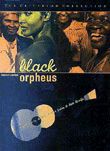Rio de Janeiro’s Favelas: Three Great Films
Travel Blog • World Hum • 06.23.08 | 4:08 PM ET

Favelas in Rio de Janeiro are largely stateless, marginalized places mostly controlled by drug gangs. A number of filmmakers have explored the inequality and violence found there, and the result has made for powerful and, at times, controversial movies. Such is the case with the recent Brazilian film “Tropa De Elite” (“Elite Squad”). The award-winning film is told from the point of view of a fictional cop, Captain Nascimento, who is a member of Rio’s police special-forces unit. With a child on the way, Nascimento wants to survive his last mission: pacifying a favela before the Pope arrives. Unfortunately, it hasn’t been widely released, and it isn’t available with English subtitles on DVD, but here are three great films you can easily find:
Favela Rising (2005)
Directed by Jeff Zimbalist and Matt Mochary, this documentary tells the story of the birth of the social project and band called AfroReggae. Set largely in a favela called Vigário Geral, a place that is described as the “Brazilian Bosnia,” the film focuses on the life of Anderson Sa, the cofounder of this N.G.O. Recalling his childhood in the favela, Anderson says, “Instead of falling asleep with our mothers singing to us, we fell asleep to gunshots and people screaming. The sounds of violence.” The first half of the film is shocking in its depiction of brutality in Vigário Geral. “I would witness tortures, murders. I was hanging out with criminals,” Anderson says. But after Anderson’s brother is killed, he decides to try to find a way to stop the violence. Along with a man named Jose Junior, they launch AfroReggae, a music and dance group that actively recruits members who, once they join, must forsake drugs and alcohol. “Through music we changed our reality,” Anderson says. The directors received the Best New Documentary Filmmaker award at the TriBeCa Film Festival in 2005. NPR has more.

City of God (2002)
Perhaps the most well-known movie in the genre, this film directed by Kátia Lund and Fernando Meirelles is set in a real slum in Rio de Janeiro called City of God (in Portuguese, Cidade de Deus). The film tells the story of Rocket, an aspiring photographer, and through him, it also reveals life in the favela. A sinister drug boss named Li’l Ze rules, and much of the movie is devoted to the favela’s drug and gun culture. As violence between opposing drug gangs increases, Rocket pursues three goals: staying alive, becoming a photographer and losing his virginity. The details are powerful. We see life in the favela through the images of a knife being sharpened, a chicken being slaughtered, and carrots being chopped. We see the rows of symmetrical houses, and the hard, flat white light on the street, and we see the flickering strobe lights of a dance party following a murder.

Black Orpheus (1959)
Unlike the other films mentioned here, there are no drugs or guns in “Black Orpheus,” or “Orfeu Negro.” The French-made film is a retelling of the Orpheus myth set in Rio’s favelas, and the movie’s hero is indeed a man named Orpheus who falls in love with a woman named Eurydice. Although the film provides a “rather romanticized portrayal” of favela life, as The New York Times put it in an article about favela tourism, it’s well worth seeing, if only as a piece of art. Much of the film is musical. In one of the first scenes, a boat arrives with Eurydice on it, and everyone on the ship is dancing as it docks. The beat and the party continue from there, while Eurydice tries to escape a pursuer intent on killing her. The film is moving for its simplicity, its cyclical feel, its music and beat, its striking colors. It won the Best Foreign Language Film Oscar in 1959.
Rob Verger also wrote Slumming in Rio and narrated the slideshow Inside Slum Tourism for World Hum.
Heather 06.24.08 | 3:41 AM ET
“City of God” was a great movie. Has anybody seen the follow-up “City of Men” (Cidade dos Homens)?
Neto 06.25.08 | 10:22 AM ET
Why is everybody always sweating foreign ghettos? Shows like “The Wire” and movies like “New Jack City” show what’s going on right in the USA, yet domestic suffering and underdevelopment doesn’t seem so glamorous. I guess without the beach and exotic vowels of Portuguese, Detroit’s hood just doesn’t have the same appeal.